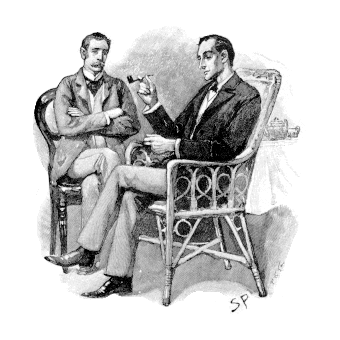At that instant there was a clatter and a rattle in the street below. Looking down I saw a stately carriage and pair, the brilliant lamps gleaming on the glossy haunches of the noble chestnuts. A footman opened the door, and a small, stout man in a shaggy astrakhan overcoat descended. A minute later he was in the room.
Charles Augustus Milverton was a man of fifty, with a large, intellectual head, a round, plump, hairless face, a perpetual frozen smile, and two keen gray eyes, which gleamed brightly from behind broad, gold-rimmed glasses. There was something of Mr. Pickwick’s benevolence in his appearance, marred only by the insincerity of the fixed smile and by the hard glitter of those restless and penetrating eyes. His voice was as smooth and suave as his countenance, as he advanced with a plump little hand extended, murmuring his regret for having missed us at his first visit. Holmes disregarded the outstretched hand and looked at him with a face of granite. Milverton’s smile broadened, he shrugged his shoulders removed his overcoat, folded it with great deliberation over the back of a chair, and then took a seat.
“This gentleman?” said he, with a wave in my direction. “Is it discreet? Is it right?”
“Dr. Watson is my friend and partner.”
“Very good, Mr. Holmes. It is only in your client’s interests that I protested. The matter is so very delicate — –”
“Dr. Watson has already heard of it.”
“Then we can proceed to business. You say that you are acting for Lady Eva. Has she empowered you to accept my terms?”
“What are your terms?”
“Seven thousand pounds.”
“And the alternative?”
“My dear sir, it is painful for me to discuss it, but if the money is not paid on the 14th, there certainly will be no marriage on the 18th.” His insufferable smile was more complacent than ever.
Holmes thought for a little.
“You appear to me,” he said, at last, “to be taking matters too much for granted. I am, of course, familiar with the contents of these letters. My client will certainly do what I may advise. I shall counsel her to tell her future husband the whole story and to trust to his generosity.”
Milverton chuckled.
“You evidently do not know the Earl,” said he.
From the baffled look upon Holmes’s face, I could see clearly that he did.
“What harm is there in the letters?” he asked.
“They are sprightly — very sprightly,” Milverton answered. “The lady was a charming correspondent. But I can assure you that the Earl of Dovercourt would fail to appreciate them. However, since you think otherwise, we will let it rest at that. It is purely a matter of business. If you think that it is in the best interests of your client that these letters should be placed in the hands of the Earl, then you would indeed be foolish to pay so large a sum of money to regain them.” He rose and seized his astrakhan coat.
Holmes was gray with anger and mortification.
“Wait a little,” he said. “You go too fast. We should certainly make every effort to avoid scandal in so delicate a matter.” Milverton relapsed into his chair.
“I was sure that you would see it in that light,” he purred.
“At the same time,” Holmes continued, “Lady Eva is not a wealthy woman. I assure you that two thousand pounds would be a drain upon her resources, and that the sum you name is utterly beyond her power. I beg, therefore, that you will moderate your demands, and that you will return the letters at the price I indicate, which is, I assure you, the highest that you can get.”
Milverton’s smile broadened and his eyes twinkled humorously.
“I am aware that what you say is true about the lady’s resources,” said he. “At the same time you must admit that the occasion of a lady’s marriage is a very suitable time for her friends and relatives to make some little effort upon her behalf. They may hesitate as to an acceptable wedding present. Let me assure them that this little bundle of letters would give more joy than all the candelabra and butter-dishes in London.”

